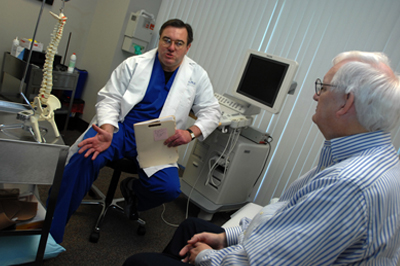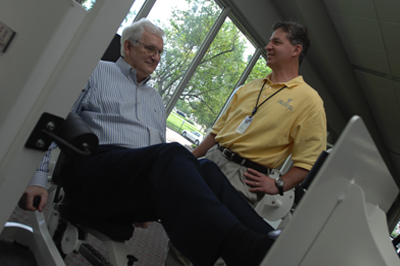Millard Frazier’s back hurt so bad, he could barely walk.
On the worst days, he would lie flat on his back, doped up on pain meds and thinking: This is no way to live.
Unwilling to undergo surgery, Frazier feared he might be in agony forever. Then he began seeing Dr. Kenneth Fox, a physician who specializes in physical medicine and rehabilitation (PM&R). And within a month, he was “walking straight and pain-free.”
“It was a blessing the Lord sent me to him,” said the Clinton resident. “Now my back very seldom hurts.”
Happenstance put the two together. Dr. Fox had recently closed his New York City practice to join the staff of Methodist Spine & Joint Center. And a real estate friend of Frazier’s was helping the physician find housing near his Flowood office.
“We went out to eat with Dr. Fox, and I mentioned my back pain.” Frazier said. Dr. Fox said: ‘Why don’t you come to my office and we will do an exam.’ ”
Dr. Fox wasn’t surprised that Frazier didn’t know much about rehab medicine, a specialty comprised of nerve, muscle, bone and brain experts who treat injury or illness non-surgically to decrease pain and restore function.
The American Academy of Physical Medicine and Rehabilitation only lists 18 PM&R physicians in all of Mississippi. And that scarcity may explain why so many state residents rush to surgeons for back pain relief. Few realize there’s a specialty that advocates non-surgical solutions to alleviate pain.
“I’ve seen people who have had back pain for years who have never been to physical therapy, which amazes me,” Dr. Fox said. “We get most patients better without sending them to surgery.”
That was good news to Frazier, who dreaded going under the knife. “Over the last 10 years, I’ve had 10 major surgeries,” said the 62-year-old. “I already had a couple of vertebrae fused, and I have a plate in my neck.”
Dr. Fox said he doesn’t always discourage trips to the operating room. “Sometimes I’ll see something on the MRI and say: ‘You need surgery.’ But most pain is non-surgical, and the number of patients I have going for surgery is very small. We start with the most appropriate and least invasive treatment and move up from there.”
A thorough exam revealed Frazier had lumbosacral strain – a common cause of the low back pain that strikes 70 to 80 percent of all men. To address the condition, Dr. Fox prescribed a multifaceted regimen that included soft tissue massage, transcutaneous electrical nerve stimulation (TENS) and physical therapy.
“TENS works on blocking pain by bombarding the brain with sensory stimulation and overriding the nerves that transmit pain,” explained Steve Friend, a physical therapist that worked with Frazier at Methodist Outpatient Rehabilitation in Flowood. “We also did soft tissue treatment to decrease tenderness. Our initial goal was to get his pain level down so he could start exercising.”
For a month, Frazier spent three lunch hours a week working on his flexibility and strengthening muscles that support the spine. He also followed up with a home exercise program, “which is probably the key that turns everything,” Friend said.
“Physical therapy teaches patients what they can do to treat their own pain, which is ideal,” Dr. Fox said.
As director of personnel and human resources for Capital Services Corporation in Jackson, Frazier has the kind of desk-bound lifestyle that contributes to back pain. But he has learned the strategies to keep recurrences at bay.
“My pain level used to be like 9.999 out of 10 and now I’m a zero,” Frazier said. “I contribute it all to the therapists at Methodist Rehab and Dr. Fox.”
Methodist Spine and Joint Center is one part of the more comprehensive Methodist Pain Management Services, a highly regarded 10-year-old program located on Methodist Rehab’s east campus in Flowood. Physicians, therapists, nurses and other pain management specialists all work together – under one roof – to provide patients with easily accessible and efficient pain management services. This collaboration of experienced clinicians provides effective treatment of back and joint pain from “head to toe”.
Services include clinical evaluation and non-surgical treatment for injuries and illnesses such as neck, shoulder and back pain, lower extremity pain, cumulative trauma injuries such as carpal tunnel, sprains and strains, sports-related injuries, complex regional pain syndrome and recovery following joint replacement surgery. In cases where surgery is indicated, our physicians work with patients to make an appropriate referral to a well qualified surgeon. To learn more or to schedule an appointment, call 601-936-8801.


